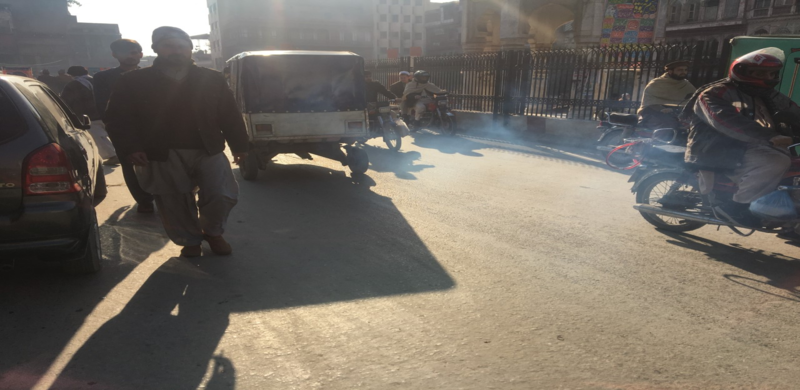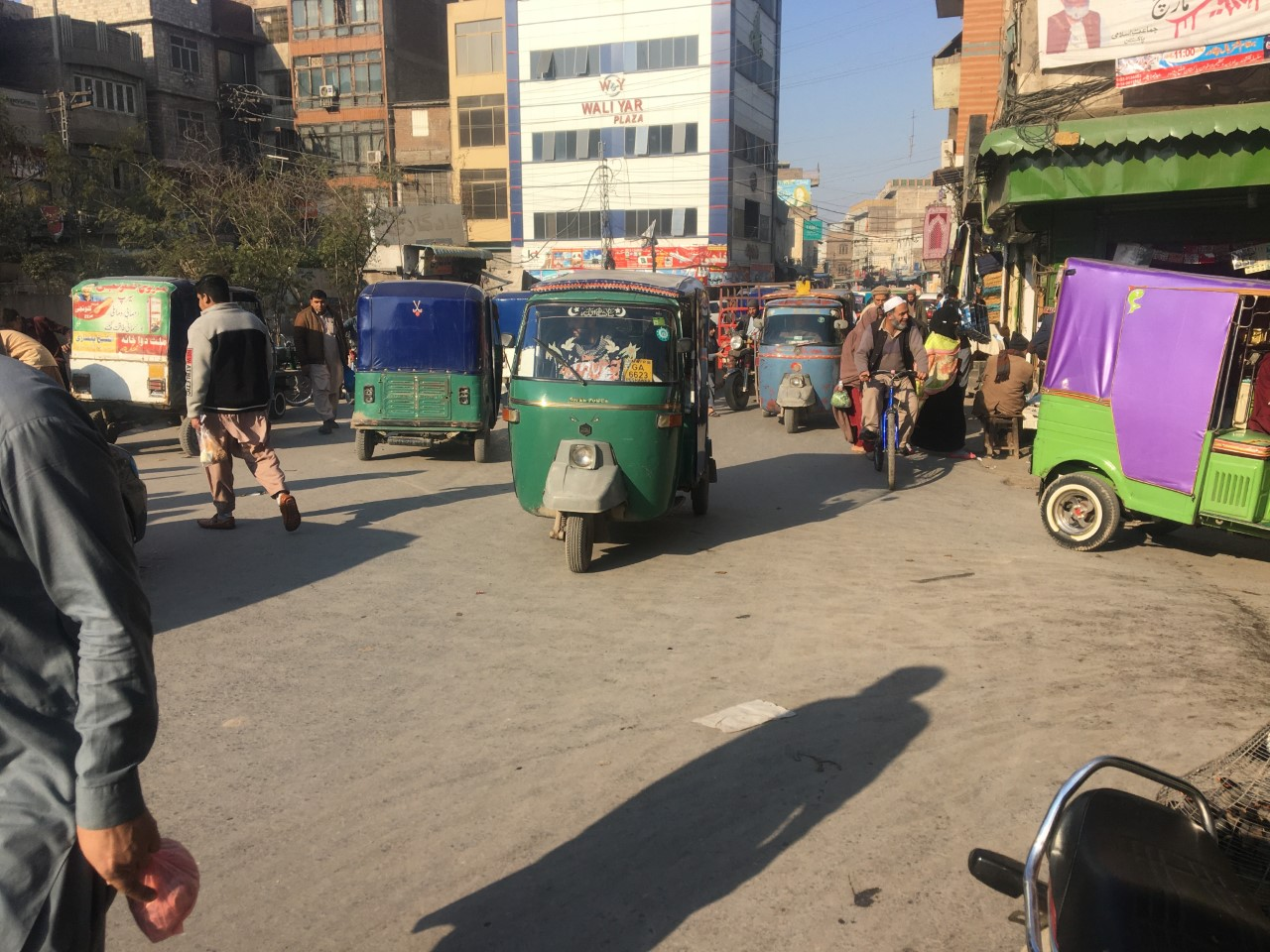
Peshawar
The government needs to encourage people to invest in pollution-free electric vehicles in Khyber Pakhtunkhwa in order to tackle pollution in the province, according to a Peshawar-based businessman Bilal Afridi.
Bilal Afridi, who was one of the first ones to invest in an electric rickshaw in 2015 with the aim of providing a cheap source of travelling and pollution-free vehicles.
Air pollution in Peshawar has reached alarming levels, damaging the health of its residents, especially those suffering from asthma.
“It’s been hard to travel in the city as the level of pollution is increasing with every passing day and is affecting the residents of Peshawar,” a commuter, Sohail Kareem, told Naya Daur.
He stated that air pollution was damaging the health of the residents and especially those who were struggling with the asthma.
Kareem added that he was a patient of asthma disease and it had now become impossible for him and others to travel in the provincial capital because of increasing pollution in the city.
According to the World Health Organization (WHO) 2011 report, Peshawar was ranked as the sixth most polluted city in the world.
Similarly, according to the Environment Protection Agency (EPA) 2017 report, the emission of air pollutants is directly related to consumption of petroleum products and in large part has been contributed by vehicular emissions.
A report revealed that samples were collected from different parts of the city and the results showed that the level of five gases, including Carbon Monoxide (CO), Nitric Oxide (NO), Nitrogen Dioxide (NO2), Sulfur Dioxide (SO2), particulate matter (PM2.5), exceeded the National Environmental Quality Standard (NEQS). However, an alarming fact is that particulate matter is 400 percent more than NEQS in Peshawar.
Naya Daur learnt that 24,000 rickshaws were registered with Regional Transport Authority (RTA) while approximately 70000 Rickshaws were unregistered.

Similarly, more than 1,000 unregistered taxis and thousands of buses and vehicles were also running in the city.
While talking to rickshaw drivers, Naya Daur found out that they were consuming five to seven litres of fuel everyday. They admitted that it was one of the basic reasons behind increasing air pollution in the city. However, they viewed that they had no other choice till the government provided them with no alternative.
Due to lack a of interest of interest on part of Khyber Pakhtunkhwa Government, the private companies were reluctant to invest and introduce pollution-free vehicles, including electric rickshaw, in the provincial capital.
Peshawar-based businessman, Bilal Afridi, claimed that he invested in an electric rickshaw in 2015 with the aim to introduce pollution-free vehicles and providing a cheap source of travelling in Peshawar.
Afridi continued that the step was appreciated, and the then local government minister inaugurated an electric rickshaw scheme. He added that later, the transport and excise departments created hurdles in the project.
Afridi suggested that the government needed to encourage the people to invest in pollution-free electric vehicles in the province as it will not only be instrumental in decreasing the pollution level, but will surely revolutionise the transport sector of Khyber Pakhtunkhwa.
The government needs to encourage people to invest in pollution-free electric vehicles in Khyber Pakhtunkhwa in order to tackle pollution in the province, according to a Peshawar-based businessman Bilal Afridi.
Bilal Afridi, who was one of the first ones to invest in an electric rickshaw in 2015 with the aim of providing a cheap source of travelling and pollution-free vehicles.
Air pollution in Peshawar has reached alarming levels, damaging the health of its residents, especially those suffering from asthma.
“It’s been hard to travel in the city as the level of pollution is increasing with every passing day and is affecting the residents of Peshawar,” a commuter, Sohail Kareem, told Naya Daur.
He stated that air pollution was damaging the health of the residents and especially those who were struggling with the asthma.
Kareem added that he was a patient of asthma disease and it had now become impossible for him and others to travel in the provincial capital because of increasing pollution in the city.
According to the World Health Organization (WHO) 2011 report, Peshawar was ranked as the sixth most polluted city in the world.
Similarly, according to the Environment Protection Agency (EPA) 2017 report, the emission of air pollutants is directly related to consumption of petroleum products and in large part has been contributed by vehicular emissions.
A report revealed that samples were collected from different parts of the city and the results showed that the level of five gases, including Carbon Monoxide (CO), Nitric Oxide (NO), Nitrogen Dioxide (NO2), Sulfur Dioxide (SO2), particulate matter (PM2.5), exceeded the National Environmental Quality Standard (NEQS). However, an alarming fact is that particulate matter is 400 percent more than NEQS in Peshawar.
Naya Daur learnt that 24,000 rickshaws were registered with Regional Transport Authority (RTA) while approximately 70000 Rickshaws were unregistered.

Similarly, more than 1,000 unregistered taxis and thousands of buses and vehicles were also running in the city.
While talking to rickshaw drivers, Naya Daur found out that they were consuming five to seven litres of fuel everyday. They admitted that it was one of the basic reasons behind increasing air pollution in the city. However, they viewed that they had no other choice till the government provided them with no alternative.
Due to lack a of interest of interest on part of Khyber Pakhtunkhwa Government, the private companies were reluctant to invest and introduce pollution-free vehicles, including electric rickshaw, in the provincial capital.
Peshawar-based businessman, Bilal Afridi, claimed that he invested in an electric rickshaw in 2015 with the aim to introduce pollution-free vehicles and providing a cheap source of travelling in Peshawar.
Afridi continued that the step was appreciated, and the then local government minister inaugurated an electric rickshaw scheme. He added that later, the transport and excise departments created hurdles in the project.
Afridi suggested that the government needed to encourage the people to invest in pollution-free electric vehicles in the province as it will not only be instrumental in decreasing the pollution level, but will surely revolutionise the transport sector of Khyber Pakhtunkhwa.
